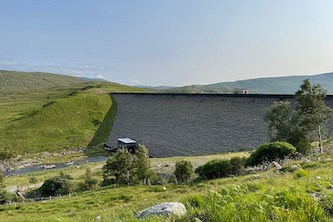SSE, the Perth-based electricity infrastructure giant, has announced plans to progress a new pumped storage hydropower scheme at Loch Fearna in Scotland’s Great Glen in a 50:50 development joint venture with a consortium led by Gilkes Energy.
The proposed co-development is located at the western end of Glengarry around 25km west of Invergarry and adjoins SSE Renewables’ existing Loch Quoich reservoir in the Great Glen hydro scheme.
SSE said the Fearna site’s mountainous location is particularly suited to a pumped hydro storage project, as it provides a high head with an average of 376m, along with short tunnels approximately 1km long connecting the two water bodies.
The company said the geology and topography around the existing upper Loch Fearna are also ideal, acting as a natural bowl shape, allowing straightforward modification to form a new, larger upper reservoir which would blend into the landscape. It said these key site characteristics and design features would make the project highly cost competitive.
“SSE Renewables already operates the largest fleet of hydro-electric power and pumped storage hydro assets in Scotland,” said SSE.
“It is now progressing development plans for new pumped storage hydropower projects in the Highlands to complement its existing fleet and deliver the large-scale, long-duration electricity storage (LDES) needed as part of Britain’s future energy mix.
“The Fearna Pumped Storage Hydro (PSH) project envisages the development of tunnels and a new power station connecting SSE Renewables’ existing reservoir at Loch Quoich with an upper reservoir at Loch Fearna.
“Under the terms of the joint venture being announced today, Gilkes Energy will lead the project’s development under a development services agreement with SSE Renewables.
“It is envisaged the proposed development would be up to 1.8GW in generating capacity and capable of producing around 37GWh of stored energy capacity. The project has already secured a grid connection offer totalling 1,795MW.
“A request for a scoping opinion for the project is currently before Scottish Government ministers and consultation has already commenced with consulting local communities and organisations.
“It is expected a planning consent application would be submitted to Scottish Government ministers in due course, and if consented for development, Fearna could be one of the largest pumped storage hydro projects in the UK. The project could reach commercial operations in the mid-2030s, subject to reaching a final investment decision.
“Earlier this year the UK Government consulted on their minded-to decision to implement a cap and floor investment framework for long-duration electricity storage including pumped storage hydro. The outcome from the consultation is expected by the end of 2024, with the first application window for projects potentially opening in 2025.”
Ross Turbet, Head of Investment Management for Hydro, SSE Renewables, said: “As the UK transitions to net zero, the development of additional pumped storage hydro projects will be crucial for energy security and for balancing an increasingly renewables-led energy system during periods when the wind doesn’t blow, and the sun doesn’t shine.
“The proposed Fearna project is a welcome addition to our development pipeline of pumped storage hydro projects, which also includes our proposal to develop what could be one of Britain’s biggest pumped storage schemes in 40 years at Coire Glas and our intention to convert our existing Sloy Power Station into a pumped storage facility.
“Our vision for the delivery of pumped energy storage solutions for a net zero Britain demonstrates SSE Renewables’ ongoing commitment to optimising the value of our existing hydro assets while investing in new hydro projects as part of our wider renewable portfolio.”
Carl Crompton, Managing Director, Gilkes Energy Limited, said: “We are delighted to launch, in partnership with SSE Renewables, the Fearna Pumped Storage project.
“Energy storage allows energy produced during times of excess generation (mainly wind) to be stored and released later when there is a deficit of renewable energy. Pumped Storage Hydro projects are in effect very large water batteries and the technology behind these projects is very mature and robust. PSH projects can easily last for 100+ years with no degradation in performance.
“The recent publication of the Government Consultation on Long Duration Electricity Storage (LDES) support, likely to be a ‘Cap & Floor’ mechanism, is also a significant step forward. This Consultation recognizes both the value of Pumped Storage Hydro, but also the challenge of financing such capital intensive and long lead time projects.
“The proposed Cap & Floor mechanism has been used successfully to bring multiple interconnector projects to fruition, and we hope a similar mechanism will unlock the financing of a number of PSH projects. We look forward to bringing this pioneering project to fruition.”
